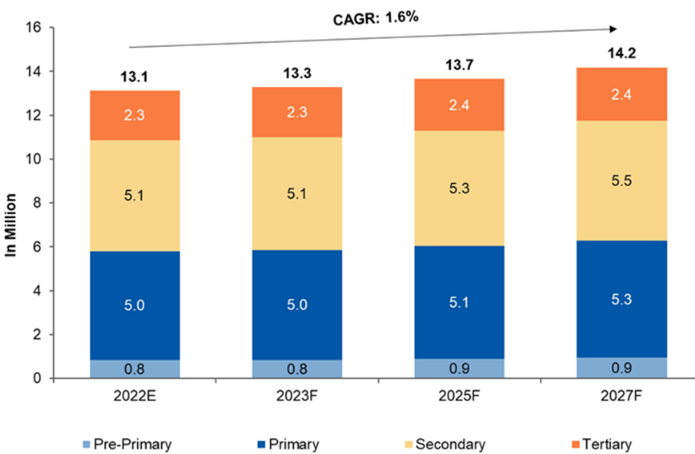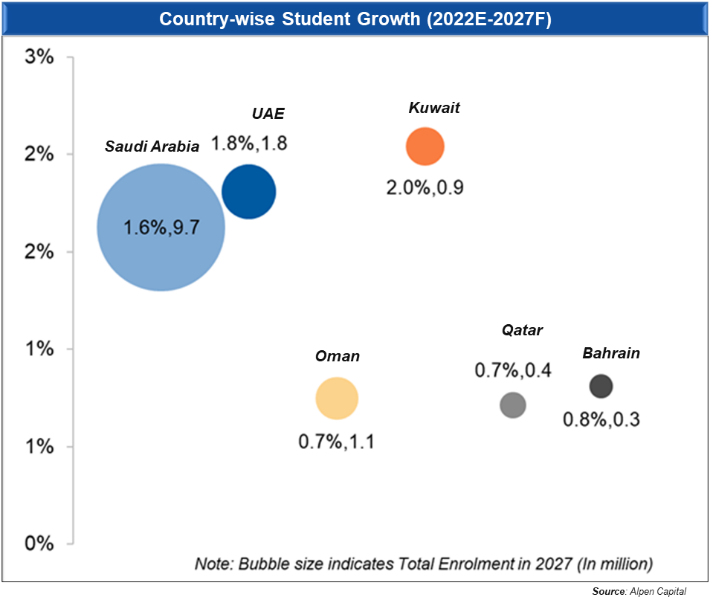According to Alpen Capital, the total number of students in the GCC education sector is projected to increase by 1.1 million to reach 14.2 million by 2027, growing at a CAGR of 1.6% from an estimated 13.1 million in 2022. Growing school age population, high per capita income, sizeable budgetary allocations and favourable government initiatives are expected to drive future growth of the sector. Moreover, the growing adoption of technology and ramping up of investments in digitally aided platforms will help boost the quality of education across the GCC

Between 2022 – 2027, the pre-primary and tertiary segments are expected to grow at a faster rate than the other segments. The pre-primary segment is expected to grow at a CAGR of 2.2% aided by the growing awareness of early-age education and the tertiary segment is expected to grow at a CAGR of 1.7% owing to increasing demand and an enabling environment. The primary and secondary segments, which constitute the majority share of enrolments are expected to witness a growth of 1.5% CAGR.
The number of students in private schools is projected to grow at a CAGR of 1.7%, whereas enrolments at public schools is likely to increase at a marginally slower pace, recording a CAGR of 1.5% between 2022 and 2027.
Growth rates among the GCC nations varies widely owing to country-specific population projections, cost of education, government support and maturity of the sector, among other factors. Saudi Arabia is expected to remain the largest education market in the GCC growing at a CAGR of 1.6%. In terms of annualized growth, the number of students in Kuwait and UAE are projected to grow at a faster rate than the other member nations between 2022 and 2027
The demand for schools in the GCC is likely to increase at a CAGR of 0.7% translating to an addition of an estimated 1,127 schools by 2027 to reach 35,208. While the demand for public schools is expected to increase at a CAGR of 0.4% between 2022 and 2027, the number of private schools is anticipated to grow at a faster rate of 1.5%.

The report states that the projected economic growth of the region will allow the GCC governments to increase their budgets towards the education sector and allocate substantial funds towards infrastructure development programs. In addition to the organic growth in population, rise in the number of expatriates and high net-worth individuals across the GCC is likely to boost the region’s private education sector as they seek for international schools offering high quality education, at par with global standards. Furthermore, introduction of new visa categories for exceptional talents, scientists, and outstanding students and graduates will encourage them to continue to live and work in the country, thus building a skilled workforce that can contribute to economic development.
However, factors such as high cost of construction, inflationary pressure, long gestation period, rising competition, and lack of subsidies are increasing cost pressures and eroding profit margins for private operators in the education sector. The sector also continues to face a shortage of skilled teachers which is expected to intensify given a healthy pipeline of new international schools being set up in the region.
The report also highlights that regional governments, in collaboration with public and private participants, are playing a critical role in transforming traditional learning methods into blended digital capabilities to facilitate learning. Consequently, EdTech platforms have grown exponentially in recent years enabling schools to provide higher engagement and flexibility. Inequality within the private school system due to the fee structures and corresponding levels of quality is supporting the rise in demand for affordable schooling in the GCC. The region is also witnessing the establishment of a number of foreign colleges and universities, particularly those from the UK and the US to meet the rising demand.
The GCC countries are making considerable investment towards the education sector in order to curate an ecosystem that meets international standards. Consequently, the sector has undergone significant transformation in recent years, particularly with the integration of technology. Building a strong technology infrastructure will not only complement the overall development of the GCC education ecosystem, but also further open the sector for higher growth and investment opportunities.
To download the report, please click here.

 Back
Back